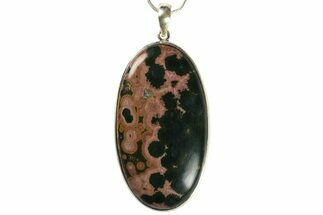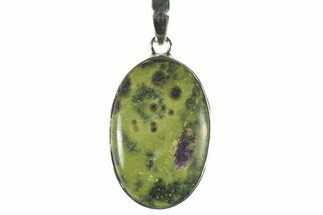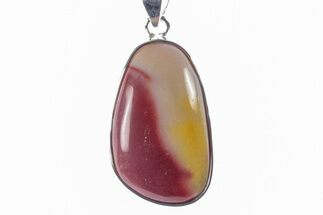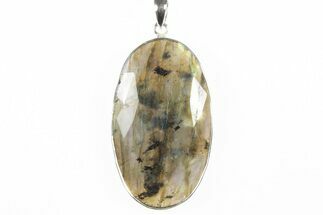1.2" Brilliant Blue Labradorite Pendant with Chain
This is an eye-catching labradorite pendant featuring a beautiful, polished blue labradorite stone set in 925 sterling silver. The pendant itself is 1.2" long (including loop). A 24" silver plated snake chain with a lobster clasp is included with the pendant. You will receive the exact pendant pictured.
About Labradorite
Labradorite is a feldspar mineral most often found in mafic igneous rocks. Some specimens of labradorite exhibit what is called a "Schiller effect"; a strong play of iridescent blue, green, red, orange, and yellow colors. Labradorite is so well known for these spectacular displays of color that the phenomenon is also known as labradorescence. Specimens with high quality labradorescence are often polished and used as gemstones.
The labradorescence is not caused by the colors breflecting on the surface of the specimen. Instead, light enters the stone, hits a twinning crystal lattice surface within the stone, and reflects from that. The color seen is the color of light reflected from that twinning surface. Different twinning surfaces within the stone reflect different colors of light. Light reflecting from different twinning surfaces in various parts of the stone can give the stone a multi-colored appearance.
Labradorite is named after Labrador, Canada, where it was first found. Today, the most prolific deposits for most commercially available labradorite occur in Madagascar and Russia.
Labradorite is a feldspar mineral most often found in mafic igneous rocks. Some specimens of labradorite exhibit what is called a "Schiller effect"; a strong play of iridescent blue, green, red, orange, and yellow colors. Labradorite is so well known for these spectacular displays of color that the phenomenon is also known as labradorescence. Specimens with high quality labradorescence are often polished and used as gemstones.
The labradorescence is not caused by the colors breflecting on the surface of the specimen. Instead, light enters the stone, hits a twinning crystal lattice surface within the stone, and reflects from that. The color seen is the color of light reflected from that twinning surface. Different twinning surfaces within the stone reflect different colors of light. Light reflecting from different twinning surfaces in various parts of the stone can give the stone a multi-colored appearance.
Labradorite is named after Labrador, Canada, where it was first found. Today, the most prolific deposits for most commercially available labradorite occur in Madagascar and Russia.
$45
SPECIES
Labradorite
LOCATION
Maniry, Madagascar
SIZE
Pendant: 1.2" long (including loop), Chain: 24" long
CATEGORY
ITEM
#302787
 Reviews
Reviews









